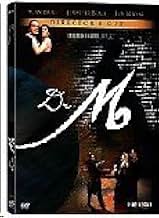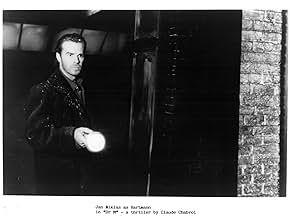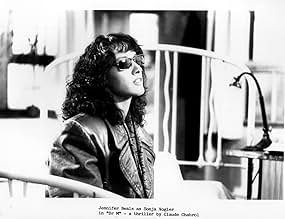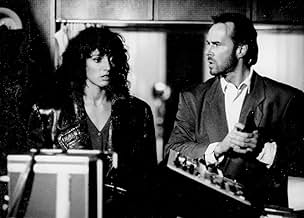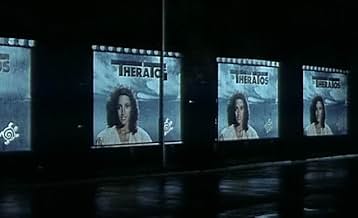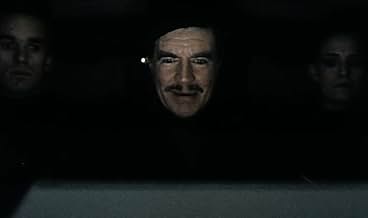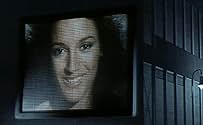Ajouter une intrigue dans votre langueInvestigating a series of suicides, police detective reveals a sinister plot.Investigating a series of suicides, police detective reveals a sinister plot.Investigating a series of suicides, police detective reveals a sinister plot.
- Réalisation
- Scénario
- Casting principal
Avis à la une
A Frenchman directing mostly Germans speaking awkward phonetic English--that's just one of the problems here, but it's a big one, since so many of the actors here stiltedly handle dialogue that would be problematic under ideal circumstances. The only person here who seems to have a firm grip on what he's doing is Alan Bates, who chooses to play his media-mogul villain role for arch comedy. As a result, he seems to be in a different movie, so at least this one doesn't embarrass him like the luckless other performers.
Jennifer Beals has the right droning, narcotic quality in scenes where she's the hypnotic face/voice of sinister advertisements, but elsewhere she has to rely on her acting abilities, which are limited as usual. Jan Niklas has apparently been excellent elsewhere, but he's dreadful here as the noirishly cynical investigating hero. Andrew McCarthy has exactly one brief scene as an assassin--he does get special billing, but it's neither a cameo or supporting role, just a straight-up bit part (I hope he fired his agent after this).
Many people have said this film doesn't make much sense. and I'll have to take their word for it--it's so turgid I might well have not paying attention if/when there were elements that did somehow explain things. There's an inexplicable suicide epidemic in a faintly futuristic Berlin. Like Francois Truffault before him (in "Fahrenheit 451"), Chabrol has no particular feel for sci-fi or dystopian fantasy, despite OK production design. He doesn't even try to build suspense around the possibility of sudden violent death at any moment, and the deaths when they occur are indifferently staged.) There are ridiculous scenes in a quasi-fascist quasi-punk club where everyone dresses in designer black; they dance like performance artists trying cluelessly to imitate a mosh pit. There's also one of those hysterically pretentious sex scenes in which naked gyrations (Beals no doubt using a body double) are intercut with archival footage of nuclear explosions, war crimes, etc. Oh, the humanity. Things get even sillier when the protagonists go to a bizarre "resort"--hence the retitling "Club Extinction"--that's like Club Med meets Jonestown meets "The Prisoner."
Unfortunately, the whole film is so misconceived and lifeless there's little camp entertainment value to its mess. One among "Dr. M's" many misfortunes is that it was filmed in 1989, and the script makes much of tensions between Wall-separated East and West--but of course that division had collapsed by the time it came out.
Jennifer Beals has the right droning, narcotic quality in scenes where she's the hypnotic face/voice of sinister advertisements, but elsewhere she has to rely on her acting abilities, which are limited as usual. Jan Niklas has apparently been excellent elsewhere, but he's dreadful here as the noirishly cynical investigating hero. Andrew McCarthy has exactly one brief scene as an assassin--he does get special billing, but it's neither a cameo or supporting role, just a straight-up bit part (I hope he fired his agent after this).
Many people have said this film doesn't make much sense. and I'll have to take their word for it--it's so turgid I might well have not paying attention if/when there were elements that did somehow explain things. There's an inexplicable suicide epidemic in a faintly futuristic Berlin. Like Francois Truffault before him (in "Fahrenheit 451"), Chabrol has no particular feel for sci-fi or dystopian fantasy, despite OK production design. He doesn't even try to build suspense around the possibility of sudden violent death at any moment, and the deaths when they occur are indifferently staged.) There are ridiculous scenes in a quasi-fascist quasi-punk club where everyone dresses in designer black; they dance like performance artists trying cluelessly to imitate a mosh pit. There's also one of those hysterically pretentious sex scenes in which naked gyrations (Beals no doubt using a body double) are intercut with archival footage of nuclear explosions, war crimes, etc. Oh, the humanity. Things get even sillier when the protagonists go to a bizarre "resort"--hence the retitling "Club Extinction"--that's like Club Med meets Jonestown meets "The Prisoner."
Unfortunately, the whole film is so misconceived and lifeless there's little camp entertainment value to its mess. One among "Dr. M's" many misfortunes is that it was filmed in 1989, and the script makes much of tensions between Wall-separated East and West--but of course that division had collapsed by the time it came out.
Good idea for a moody futuristic thriller, nice art direction and location photage of Berlin cannot help this european movie mess. Famous french director Chabrol is at a loss with german actors speaking english and lovely Jennifer Beals given no direction at all. It all seems totally unrehearsed one-take filming. Bad sound and lighting do not help. A chance to make an atmospheric Blade Runneresque thriller went down the E.U. drain. A dull waste with interesting ideas worth a remake.
My review was written in January 1991 after watching the film on Prism video cassette.
Claude Chabrol goes sci-fi with depressing results in "Dr. M", an already dated 1989 European production that opened in Paris last November but reaches the U.. in video stores and retitled "Club Extinction".
Film is inspired by Fritz Lang's classic "Dr. Mabuse" features, but Chabrol clearly is not comfortable with this form. The dialog is stilted, and many scenes are designed for somnambulist acting more suited to the expressionism of Robert Wiene's "Dr. Caligari" than Lang's work.
Alan Bates plays two roles: the title Dr. Marsfeldt, head of a German media conglomerate, and (uncredited) a white bearded guru who lords it over a Marsfeldt-owned resort Club Theratos that's closer to Jim Jones' Jonestown than Club Med. As the guru, he talks in a funny voice and hams it up embarrassingly.
The Berlin Wall is used throughout "Dr. M" as a metaphor for modern malaise, its presence contaminating the stry's Berliners in a way now hopelessly dated since the wall was torn down. Using tv spokesmodel Jennifer Beals as his main instrument, Dr. M is causing Berliners to commit suicide by sending out subliminal messges over the airwaves beneath broadcasts exhorting folks to escape for a vaction at Theratos.
Jan Niklas plays the dogged police investigor trying to make sense of the rash of suicides, all of which point at Beals' involvemetn. He predictably falls in love with her and ultimately accompanies her to Theratos for an anticlimactic ending.
Except for repetitive use of an annoying noise-song by Mekong Delta to suggest the anomie of folks at a local nightclub, "Dr. M" is easy to watch. Best performance is by Hanns Zischler, erstwhile co-star of Wim Wenders' "Kings of the Road", who has honed his English dialog delivery to perfection.
Guest star Andrew McCarthy, who toplined Chabrol's "Quiet Days in Clichy", pops up briefly as an assassin.
Claude Chabrol goes sci-fi with depressing results in "Dr. M", an already dated 1989 European production that opened in Paris last November but reaches the U.. in video stores and retitled "Club Extinction".
Film is inspired by Fritz Lang's classic "Dr. Mabuse" features, but Chabrol clearly is not comfortable with this form. The dialog is stilted, and many scenes are designed for somnambulist acting more suited to the expressionism of Robert Wiene's "Dr. Caligari" than Lang's work.
Alan Bates plays two roles: the title Dr. Marsfeldt, head of a German media conglomerate, and (uncredited) a white bearded guru who lords it over a Marsfeldt-owned resort Club Theratos that's closer to Jim Jones' Jonestown than Club Med. As the guru, he talks in a funny voice and hams it up embarrassingly.
The Berlin Wall is used throughout "Dr. M" as a metaphor for modern malaise, its presence contaminating the stry's Berliners in a way now hopelessly dated since the wall was torn down. Using tv spokesmodel Jennifer Beals as his main instrument, Dr. M is causing Berliners to commit suicide by sending out subliminal messges over the airwaves beneath broadcasts exhorting folks to escape for a vaction at Theratos.
Jan Niklas plays the dogged police investigor trying to make sense of the rash of suicides, all of which point at Beals' involvemetn. He predictably falls in love with her and ultimately accompanies her to Theratos for an anticlimactic ending.
Except for repetitive use of an annoying noise-song by Mekong Delta to suggest the anomie of folks at a local nightclub, "Dr. M" is easy to watch. Best performance is by Hanns Zischler, erstwhile co-star of Wim Wenders' "Kings of the Road", who has honed his English dialog delivery to perfection.
Guest star Andrew McCarthy, who toplined Chabrol's "Quiet Days in Clichy", pops up briefly as an assassin.
10bensan9
The only negative I can come up with on this is that it is kind of slow. I felt the cheapness just adds to the charm. Should be watched on VHS for best effect.
The actors are good all across the board. Jennifer Beals is a beauty. The mood is depressive and dark with nice music. The location and feel of the architecture and settings are so very cool. Kind of a state controlled European feel going on. The story is interesting and thoughtful. I thought the scenes all fit together in a great way with the sounds and such making this one really great. The repetition of seeing screens of Beals face talking about time all through the film makes it a very trippy, cool film.
I will be watching this one over and over. Awesome film!
The actors are good all across the board. Jennifer Beals is a beauty. The mood is depressive and dark with nice music. The location and feel of the architecture and settings are so very cool. Kind of a state controlled European feel going on. The story is interesting and thoughtful. I thought the scenes all fit together in a great way with the sounds and such making this one really great. The repetition of seeing screens of Beals face talking about time all through the film makes it a very trippy, cool film.
I will be watching this one over and over. Awesome film!
This is not a good film. Check out the rave reviews. They are left from people who think they have more intellect than you. They make comments like "most people won't understand this movie."
That's poor writing not superior intelligence.
The film is a very low budget fare. The story line is not compelling. And who cares if it's a quasi remake of Dr. Mabuse? So it's a bad version of it.
It reminds me more of Alphaville than Dr. Mabuse. Just not as good.
That's poor writing not superior intelligence.
The film is a very low budget fare. The story line is not compelling. And who cares if it's a quasi remake of Dr. Mabuse? So it's a bad version of it.
It reminds me more of Alphaville than Dr. Mabuse. Just not as good.
Le saviez-vous
- AnecdotesAlthough director Claude Chabrol was famous for his extreme admiration for Alfred Hitchcock, who is frequently referenced in Chabrol films, he eventually came to believe that Fritz Lang was an even more important film-maker, once telling an interviewer that "without Lang, there would be no Hitchcock". This film was designed specifically as an elaborate tribute to Lang and was released in 1990, the centenary year of Lang's birth.
- ConnexionsFollowed by Doctor Mabuse (2013)
Meilleurs choix
Connectez-vous pour évaluer et suivre la liste de favoris afin de recevoir des recommandations personnalisées
- How long is Dr. M?Alimenté par Alexa
Détails
- Durée
- 1h 56min(116 min)
- Couleur
- Mixage
- Rapport de forme
- 1.66 : 1
Contribuer à cette page
Suggérer une modification ou ajouter du contenu manquant

